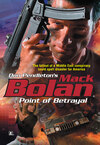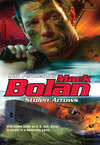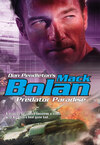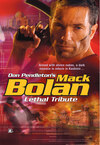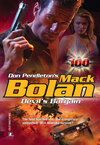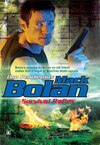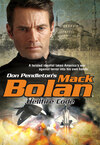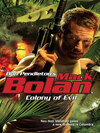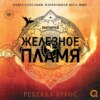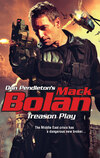Читать книгу: «Point Of Betrayal», страница 3
“You’re lucky,” the man said. “The bullet came out the other side. But you’re losing a great deal of blood.”
Abdullah waved him away. “Fight. We came here to fight.”
The mercenary grinned. “Yes, we did. And I came here for a paycheck. Unfortunately we find ourselves at odds.”
The man jabbed the barrel of his pistol into Abdullah’s forehead. Abdullah raised a hand to swat it away but never connected. Then his world went black.
Amman, Jordan
TARIQ RIYADH SAT at a table in the corner of the hotel bar, nursed his third whiskey. The hotel catered mostly to Westerners and a pianist tapped out an old jazz standard, the melody competing with the dull din of collective conversation, broken only by an occasional burst of laughter. Riyadh watched as the cigarette pinched between the first two fingers of his right hand, burned down to the filter. Discarding it, he lit another. What the hell? he thought. I have plenty of time.
A big man dressed in a summer-weight navy-blue suit, eyes obscured by a pair of mirrored aviator shades, drifting through the crowd. Clutching a glass mug of amber beer, he approached Riyadh’s table, dropped into a chair without invitation. Anger burned in Riyadh’s face, knotted his stomach, as he stared at the man, who was looking past him at a wall. With his eyes hidden and his mouth set in a neutral line, Jon Stone was as inscrutable as ever.
“They’ve killed more than three hundred,” Riyadh said. “The entire team, except for the mercenaries, are dead. They’ve also been hunting down members of their families, killing the men. I’ve lost four cousins and two nephews within the last week. One of them was twelve”
“Sorry,” Stone said, not meaning it.
“Sorry? Sorry gets me nothing.”
Stone shrugged and swallowed more beer. “It happens, man. You knew the risks going in. You don’t like how it worked out? Tough shit.”
“You knew the mission had been compromised.”
“We suspected. There’s a difference.”
“Without distinction.”
“Did you know the Egyptian mercenaries had gone rogue?”
“Maybe.”
“But you went anyway. Why?”
“Orders.”
“Whose?”
“None of your damn business.”
Riyadh thought for a moment of the 9 mm Smith & Wesson hidden under his light jacket, discarded the notion. He couldn’t shoot Stone, not here, not now. Even if he could best the man in combat, he knew he’d never make it out of the lobby without being arrested or shot by the armed guards protecting the hotel. Neither was an acceptable option. He had too much to accomplish.
“I’m making it my business,” Riyadh said.
Stone had shifted in his seat, sitting sideways so Riyadh faced his profile. He cupped the rim of the mug with his fingertips, swirled it around the table in long, lazy circles.
“Take it somewhere else, asshole. You made your bed, now lie in it. You don’t like how things worked out, tough. Truth be told, I don’t care what you think.”
“Perhaps you should start caring,” Riyadh said. Apparently, Stone caught the change of tone in Riyadh’s voice and fixed him with a hollow-eyed gaze.
“Really?” Stone said. “And why is that?”
“We both know about my little transgression with Saddam’s weapons. We also know you shook me down for a percentage of the money. I believe your country would consider that treason.”
“No one would believe you.”
“I have proof.”
“What kind.”
“None of your damn business,” Riyadh said, a smile ghosting his lips.
His hand still clasped around his drink, Stone unfurled his index finger and pointed it at Riyadh as he spoke. “If you report me,” Stone said, “you go down, too.”
Riyadh shrugged and ground out his cigarette. Setting both elbows on the table, he stacked his forearms atop each other and leaned in close to Stone.
“There’s a difference, Stone. I have nothing to live for, nothing to lose. Thanks to your bungling, I have no family, no home, no country. And if you think you can solve this problem by killing me, you’d better reconsider.”
“And why is that?”
“I have an audio copy of our previous conversation in Iraq attached to more than four dozen e-mails addressed to everyone from the CIA director to the White House to the managing editor of the New York Times,” Riyadh explained. “If I don’t check in every twenty-four hours, my people send out those e-mails. There are more than a dozen people spread out all over the globe, each with the same information, each with the same orders to distribute the information should something happen to me. You’d never stop them all.”
Stone drained his glass, shoved it away. His lips curled into a snarl as he spoke. “You little bastard. You could bury me with that stuff.”
Riyadh knew the admission cost Stone, and he made no attempt to hide his pleasure. “There are few things I’d enjoy more. Who approved the mission?”
“James Lee, the director.”
“As I thought.”
“Okay. So are we even? Are we done?”
Riyadh shook his head, grinned. “Done? Hardly, my friend. I’m just getting started.”
CHAPTER ONE
Islamabad, Pakistan, the present
His hooded head bowed, his body shrouded in heavy robes, the big man shuffled down the street, arms crossed over his midsection, apparently trying to preserve what little heat he could. He stuck close to shadows cast by nearby buildings, stumbled and limped along as though physical pain accompanied every movement. A frigid January wind whipped down the street, carrying with it discarded scraps of paper and the smells of meat, vegetables and spices simmering in neighborhood kitchens.
In furtive glances, the man’s eyes, like chipped blue ice, scanned the cityscape as he closed in on his destination.
A pair of hard-eyed men, each brandishing an AK-47, blocked his path, but the man continued on. As he approached, they stepped aside, each staring at their feet as he passed. From his peripheral vision, the hooded figure saw one of them shiver as though touched by Death itself.
Mack Bolan’s face remained impassive as he moved. Though his life was steeped in violence, he took no pleasure in intimidating others, experienced no intoxicating rushes of power or pride. That was the province of the men he sought, men who abused others simply because they could.
Besides, Bolan knew that in war—particularly his War Everlasting—things never were as they seemed. Only fools declared victory prematurely.
Case in point.
A pair of shadows fell in behind Bolan, grew larger as their owners closed in. With his peripheral vision, the Executioner glanced into a nearby storefront window, saw the two men he’d just passed move in on him. Neither had unlimbered his assault rifle, but one of the men had produced a long knife from under his heavy coat.
Unbidden, Bolan’s heart sped up and his senses came alive. His pursuers’ gaits remained steady as they came up from behind, but maintained some distance. In this case, Bolan neither wanted nor needed any combat stretch. He planned to take out both men in short order, disable them before they could unleash their firepower on him, or, more particularly, on an innocent bystander.
At the request of an acquaintance, Bolan had come to Pakistan for revenge, but not a bloodbath. If even one innocent fell during his campaign, it would be deemed a failure.
Bolan’s pursuers accelerated their approach. The soldier counted down the microseconds, waited for them to pass the point of no return. The hairs stood on the back of his neck as one of them came within grabbing distance. Simultaneously whirling and folding at the knees, Bolan’s hands came into view, clutching the Beretta 93-R and the .44-caliber Desert Eagle. One of his attackers lurched forward, grabbing handfuls of empty air and stumbling under his own momentum. Bolan moved from his path and the man crashed to the ground.
A glint of steel caught the Executioner’s eye as the other attacker brought down his blade, the razor-sharp edge slashing a collision course with Bolan’s flesh. He fell backward, rolled and came up off to his adversary’s side. The silenced Beretta coughed once, spitting a thin line of flame. The 9 mm Parabellum round slammed into the man’s face, hitting the soft area at the bridge of his nose and driving him backward. Bolan’s opponent dropped his knife.
A scream sounded from somewhere, but a burst of autofire from Bolan’s other attacker quickly drowned it out. The man still lay on the ground and was aiming the Kalashnikov rifle in haste. The bullets passed overhead as shell casings flew from the weapon, littering the ground around the man.
Bolan cursed inside. The wide-eyed man’s rifle was spitting rounds everywhere, instantly raising the odds of innocent casualties. Bolan had hoped to take one of the men alive, to turn him into an intel source. With his erratic counterattack, the man had taken that option off the table.
The big American raised the Desert Eagle and fired two rounds. Even as the thunder from the big-bore handgun shattered the afternoon, reverberating off cars and buildings, the hollowpoint rounds tunneled into the other man’s midsection, pinning his lifeless body against the wall.
The soldier rose to his full height and slipped his weapons back into the special holsters built into the sleeves of his robe.
Sirens wailed in the distance, heralding the arrival of police and emergency crews. He heard more screams from down the street, coupled with angry voices. He recognized both men from his briefing with Hal Brognola, head of the Justice Department’s Sensitive Operations Group, a day ago. They were foot soldiers, toadies for Bolan’s real quarry, international terrorist Ramsi al-Shoud.
But this was their neighborhood and they likely had friends and family here, people who loved them and would be only too happy to put a bullet in Bolan’s brain in retribution for his actions. He could understand their grief and anger all too well. And he wasn’t simple-minded enough to believe that just because the dead men in front of him were terrorists that their whole lineage had been tainted. Bolan no more wanted to shoot a grieving family member on the offensive than he would a police officer.
That didn’t mean he planned to stand here with a bull’s-eye painted on his back.
He had important work to do in Pakistan, and he needed to get on with it.
Holstering his weapons, he slipped his hood back over his head and left the killzone, navigating his way through a series of side streets and alleys. Passing a small tearoom, he heard a group of men speaking loudly, trying to drown out one another as they sipped hot beverages and smoked tobacco from water pipes. The Executioner continued at a dead run, feet barely making a sound, body hardly sagging under the weight of the robes and the weapons he carried underneath.
He had one other place to try. Al-Shoud’s money man, Pervez Shallallab, lived in an upscale neighborhood only a few blocks distant. The man employed a heavy guard and Bolan likely would have to eliminate the foot soldiers protecting him, slowing his progress and forcing him to raise more of a ruckus than he’d hoped before hitting the head man.
When circumstances dictated it, Bolan didn’t mind unleashing a boisterous campaign of hellfire and confusion. But al-Shoud was slippery, a survivor who would sacrifice his own mother before allowing an assailant to get within striking distance. In other words, a nauseating coward. The Executioner knew he was racing the clock to get to al-Shoud before he disappeared, living to terrorize another day. Making a lot of noise would only confound those efforts.
Minutes later, as dusk began to settle over Pakistan’s capital, causing the temperature to plummet, Bolan reached his quarry’s home. Ensconced in nearby shadows, the soldier scanned the ornate home and the reinforced iron gates that secured it. A trio of black Mercedes, engines running, headlight beams knifing through the wintry gray, waited in the driveway. Was the man coming or going? There was no way for Bolan to know for sure.
A well-lit street separated Bolan from Shallallab’s estate, making a stealthy approach that much more difficult. He knew he’d have to ditch the hooded robe, switch to the combat black-suit hidden underneath and sneak into the grounds. It could add several minutes onto his approach, but Bolan knew it couldn’t be helped. If these men knew about their dead comrades, they’d be on the lookout for an intruder.
A pair of fighter jets flew over low enough that Bolan almost could read their markings. The jet engines’ whine momentarily drowned out all noise and set Bolan’s teeth on edge. As the sounds echoed for another moment in his ears, he smelled cologne, heard the faint scrape of a shoe sole disturbing gravel.
Unleathering the Desert Eagle, Bolan whirled. A bulky man stood behind him, a pistol clutched in a two-handed grip.
“Your mistake,” the man said, grinning.
Fire and sound exploded from the pistol. Bullets pounded against Bolan’s chest like a sledgehammer, the blunt force stealing his breath, causing white flashes of pain to erupt in his vision. His mind raced as an overloaded nervous system tried to assimilate the fiery sensation spreading through his chest. The soldier reeled back, his legs rubbery, and fell to the ground. His skull hit the pocked asphalt, but the pain seemed little more than a distant echo of the pain created by the impact of the bullets.
The man closed in, sighted down the pistol. Bolan knew the kill shot was a heartbeat away.
Stony Man Farm, Virginia
FORTY-EIGHT HOURS EARLIER, Mack Bolan, sitting in Stony Man Farm’s War Room, studied a photo of former CIA director James Lee. From the chin up, Lee looked as if he were sleeping, eyes shut, but not squeezed tight, mouth parted an inch or so, as though snoring. From the chin down, he looked as though a bear had clawed out his throat, leaving behind a shiny mess or ragged flesh and spilled blood. Bolan stared at the close-up digital image of Lee’s face and felt his stomach knot at the sight.
The Executioner already had seen accounts of Lee’s death in both the Washington Post and the New York Times. He had a cursory knowledge of the situation. Lee, the former CIA director, had been gunned down in an alley in Islamabad less than twenty-four hours earlier. A four-man squad of Diplomatic Security Service officers, all highly skilled with weapons, had also been killed. An unidentified woman had been rescued by local police.
Surrounded by Stony Man chief Hal Brognola, mission controller Barbara Price, pilot Jack Grimaldi and armorer John “Cowboy” Kissinger, Bolan clenched and unclenched his jaws as he memorized the image down to the smallest detail. The fallen man’s left hand rested next to his head, a smooth, gold band encircling the third finger.
“He had a family,” Bolan said.
Brognola cleared his throat, nodded. “Wife, two kids. The kids came later in life, and the youngest is still in high school. I knew Jim. He was a good guy. Bit of a politician, but he believed in what he did, cared about his country. He didn’t deserve this.”
“No,” Bolan agreed, “he didn’t. What do we know?”
“You’re staring at the exit wound from a 9 mm hollowpoint round,” Brognola said. “Judging from the powder burns on the back of his neck and the path of the bullet, someone stood over him, put the barrel against his neck and fired. Jim knew it was coming.”
“He was dead instantly.” It wasn’t a question; Bolan was trying to piece together the facts, picture things just as they went down. What he saw in his mind’s eye thus far made his blood boil. “Who found him?”
“Pakistani state police. Since he was an American citizen, they called in the local FBI team to help investigate. They recovered the round that took out Lee, along with a few dozen stray slugs and shell casings. It was a damn bloodbath, Striker.”
Bolan nodded, but kept his icy blue gaze locked on the picture. “How many nut job extremist groups are claiming responsibility?”
Brognola leaned forward, pushed a folder Bolan’s direction. The soldier trapped it under his big hand and dragged it toward him, found it to be about the thickness of a rural community’s telephone book. Setting the dossier on his lap, he fanned it open and gave its contents—stacks of paper, several with photos held to them with a paper clip—a cursory glance. He knew he’d have plenty of time later to pore through it. He shut it and returned his attention to Brognola, the head of the Sensitive Operations Group.
“To answer your question,” Brognola said, “five extremist groups have taken credit.”
“How many are credible?”
“That’s the real question,” Brognola said. “Four of them are little home-grown groups. Got some AK-47s, some whacked-out ideals and plenty of bad intentions, but not the expertise to pull off something like this. Forget about them.” To punctuate his point, the big Fed waved his right hand dismissively. With practiced ease, he snatched up his cigar from his ashtray, clenched it between his teeth and started chewing.
“You said four don’t have what it takes. What about the fifth?”
“That’s where things get more plausible,” Brognola said. “Barb?”
Using a nearby laptop, Price changed the image on the screen. “This is Ramsi al-Shoud.” A brown-skinned man with raven-black hair and an unruly beard and mustache of the same color stared at the assembled group. The man’s hair had receded well off his forehead, but he’d let it grow down to his shoulders.
Price continued. “Al-Shoud is a former Pakistani army officer. More recently, he was an officer with Pakistan’s intelligence service where he spent a lot of time arming, funding and training extremists so they could terrorize India. It’s estimated that he’s directly or indirectly responsible for the deaths of more than two hundred Indian citizens. He also helped give aid and comfort to the Taliban before we went to war with them.”
“You spoke of his affiliation with the Pakistani government in the past tense,” Bolan said.
“Right,” Price said. “The CIA knew about his behavior and had for years. Once Pakistan allied itself with us after September 11, we strongly encouraged them to fire him. They grudgingly complied and retired him four years ago.”
“I take it he hasn’t been puttering around the house, playing with the grandkids,” Bolan said.
Price smiled. “Hardly, Striker. He’s just taken his hate show on the road, but without official sanction, of course. He hates Americans, wants them expelled from the country. We believe he’s behind a recent car-bomb attack on our embassy in Islamabad.”
“Kill anyone?”
“Twelve Pakistanis, no Americans.”
“I assume that’s our fault, too,” Bolan said. He caught the bitterness in his tone and scowled. He’d seen so much innocent slaughter in the name of religion and nationalism that his anger toward extremists groups sometimes spilled over.
“The Pakistani government fired him,” Price stated. “But won’t take it any further. Al-Shoud still has lots of powerful friends and the president’s office worries that arresting or killing the guy might incite the extremists and lead to a coup.”
“Is he even still in the country?” Bolan asked.
Price nodded. “He splits his time between Islamabad and Waziristan, a territory located near the border of Afghanistan. The U.S. has sent CIA paramilitary teams after him, but he always gets away, probably because his contacts keep dropping a dime on us. The Company also has tried bribing various Pashtun leaders in Waziristan into turning him over. Apparently he has enough money or power to counter us.
“Or both,” Barbara said. “With his intelligence contacts, he’s been able to get everything short of nuclear missiles. That and the embassy bombing already had made him a priority target, putting him in the Agency’s top twenty-five covert targets.”
“That all changed,” Brognola said.
Leaning back in his chair, the Executioner clasped his hands behind his head and studied al-Shoud’s features, memorizing even the most minor details.
“What about the woman?” he asked. “The newspapers said she’d been rescued, but that she’d been whisked off to a U.S. Army base for a debriefing. Has she told us anything of any value?”
Price tapped another key on the laptop. An image of a pretty woman with pale blue eyes, an athlete’s tan and shoulder-length blond hair popped up on the screen.
“This is Jennifer Kinsey,” Price said. “She was Lee’s assistant and traveling companion. She’s a former CIA agent, but more recently has been assisting Lee with his diplomatic work. During the last year, they’ve traveled through Syria, Iraq, Afghanistan and Pakistan. She speaks four languages and has a law degree from Stanford. She’s supposed to be a rising star in foreign-service circles. Most people don’t know of her CIA ties.”
Bolan nodded. “But her background as an agent should be a good thing. With her training, she must have remembered something. Has she given us any good details?”
Brognola plucked the cold cigar from his mouth, tapped an end against the table. His cheeks flushed red and a scowl spread over his features. He jabbed the stogie back into the corner of his mouth, spoke around it.
“Her rescue was a little creative storytelling on the CIA’s part,” Brognola said. “Actually, Kinsey’s MIA. The evidence techs found some stray hairs, a woman’s shoe, a ripped gold chain and a torn piece of fabric from an expensive suit. They also found some of her blood, but only in small patches.”
“So you don’t know whether she was kidnapped—”
“Or she escaped,” Brognola finished. “That’s right, Striker. If I was a betting man, though, I’d say she escaped. These guys weren’t taking any prisoners.”
“So you’re asking me to find her?”
“We’re asking, is all. Alive or dead, we want to know what happened to her.”
“Okay.”
“But that’s just a small part of the mission.”
“Lay it on me, Hal.”
“The President is very concerned about this. When a terrorist can kill the former CIA director, in broad daylight, on a busy street, and take four federal agents out with him, it sends a bad message to the perpetrators and any copycats.”
“I assume the Man wants me to deliver a message of my own.”
“Yes,” Brognola said. “A very nasty one.”
Islamabad, Pakistan
HIS CHEST RIDDLED with pain, Mack Bolan summoned his strength, rolled to one side and took himself off the firing line. The robe, heavy with ballistic plating, slowed his movements just enough to dull combat-hardened reflexes.
A bullet chewed into the concrete near him. Bolan fisted the Desert Eagle and was bringing it around to fire as the other man readjusted his own aim. The warrior knew in his heart he’d never make the shot, but he had to try anyway.
Even as his gun hand whipped around, Bolan heard a staccato whisper from behind the shooter. The man stiffened and, an instant later, a swarm of bullets burst through his chest, leaving a trail of blood and bone fragments in their wake as they buzzed into the darkness.
A male silhouette, distinguished by a ball cap and submachine gun, emerged from the darkness. Bolan trained the weapon on the man, but held his fire.
“Easy, Sarge,” Jack Grimaldi said. “Just me.”
Relief washed over Bolan and a smile ghosted his lips. Using his free hand, Bolan hugged his ribs as he rolled onto his side, climbed to his feet. Pain seared his muscles, bones and joints as he rose to his full height, melting away the grin.
“You okay?”
Bolan shrugged. “As well as can be expected. I thought you were going to stay with the airplane.”
“The hell with that,” the pilot said. “You stopped answering your radio, and that made the airplane seem kind of insignificant.”
“Thanks. The radio took a bullet earlier.”
“Forget about it,” Grimaldi said. “Did Cowboy’s ballistic robe work okay?”
Bolan nodded. “The thing’s heavy as hell, but it stops bullets.”
“So, who’s this clown?” Grimaldi asked, nodding toward the shooter’s crumpled remains.
Bolan walked to the man and, using the toe of his boot, rolled him onto his back. The man was Caucasian, with hair blacker than the Executioner’s, his bloodless lips locked open in shock. Bolan didn’t recognize the man, and said as much.
“He sounded American, though,” the soldier said. “His accent sounded east coast, from what little I heard.”
Kneeling next to the man, Bolan pulled a small digital camera from the pocket of his combat suit and snapped a couple of pictures of the man’s face.
“I’ll send these back to the Farm later,” he said. “When we get back to my laptop.”
“Couple of pinups for Barb,” Grimaldi said. “I’m sure she’ll enjoy that.”
Before Bolan could reply, he heard a flurry of activity coming from the financier’s compound. The sounds of a facility heading into lockdown reached his ears. Slamming car doors, voices, engines coming to life. Not surprisingly, the gunshots had announced his approach. He’d hated to waste the time shooting the man’s picture, but finding an American running interference for an Islamic extremist group sent up a massive red flag to Bolan, one that he couldn’t ignore.
Cursing to himself, Bolan turned to Grimaldi, flashed a series of hand signals. The ace pilot nodded and was already separating himself from Bolan so they didn’t present a concentrated target. The soldier dragged the heavy robe over his head, revealing his black combat suit and web gear. He grabbed the Beretta 93-R from its sleeve holster, slipped it into his shoulder leather. He discarded the robe and moved into the shadows cast by a nearby building. Holstering the Desert Eagle, he filled his hand with an Ingram Model 10, minus the sound suppressor.
Gliding along a brick wall, he peered around the corner and saw a trio of men, each toting an AK-47, coming his way. Bolan couldn’t help but be impressed. From what he saw, each man wore a headset and two of the men hung back, using nearby cars for cover as the third closed in on the alley. Hardly Special Forces tactics, but definitely better than anything he’d encountered thus far.
Bolan momentarily wished his own radio hadn’t been damaged, but purged the recriminations. Make the best with what you have, he thought. Adapt. He had to think like the enemy. He knew Grimaldi, a battle-hardened veteran, would do likewise. He turned to the pilot, signaled him to watch their backs. The pilot nodded and turned his attention toward their rear flank.
Just as he did, a car screeched to a stop at the other end of the alley, effectively blocking them in. Electric windows hissed down and the black muzzles of assault rifles popped out, the weapons spitting flame and lead.
A thrill of adrenaline passed through Bolan. He focused on the gunners in front of him, left the other threat for Grimaldi to handle.
Caressing the Ingram’s trigger, he cut loose with a salvo that blistered the air just next to the approaching terrorist. Acting with surprising presence of mind under fire, the man shifted positions and shot back at Bolan. The rounds pounded into the bricks just behind the soldier, peppering his face with reddish grit and slivers of mortar.
The bits of debris tore at Bolan’s cheeks, opening the skin and drawing trickles of blood, but thankfully sparing his eyes. He fired again, this time dragging the weapon in a wider arc, as though dousing a raging fire. Rounds smacked into nearby cars, perforating metal, puncturing windshields. A string of bullets pounded into the shoulders and chest of the shooter, who was approaching in a crouch. The man stopped cold, then jerked for a moment under the Executioner’s merciless onslaught.
Bolan’s combat sense screamed for him to look up. Even as he did, he was on the move, crossing the trash-strewed alley with long strides. Another shooter, a heavyset man with a long, unkempt beard and a lion’s mane of black hair, was drawing down on the warrior from a fire-escape landing. Even as he came into the crosshairs of the man’s AK-47, Bolan raised his own weapon, tapped out a pair of bursts that tore into the man’s girth, knocking him back against the wall, killing him.
Reloading on the run, Bolan drew down on another of his attackers, drove the man undercover with a quick burst. At the same time Bolan heard an engine roar, saw a small caravan of cars exit the building. Bolan’s heart sank for a moment.
Target lost. Game over.
Like hell.
He’d just adapt again.
Scanning the streets for bystanders, Bolan saw none. He could at least be thankful for that much, he decided. With the streets apparently clear, he decided to unleash a little controlled chaos.
Laying down his own cover fire, Bolan pinned his attackers under a withering hail. Shell casings fell around his feet and the popping of autofire in such a small space rang in his ears. At the same time, the warrior yanked a flash-bang grenade from his web gear, pulled the pin, but held the lever.
Breaking cover, he sprinted from the confines of the alley to grab a little combat stretch. At his back, he heard the rattle of subgun fire and thought fleetingly of Grimaldi, vowed to get back to him as soon as he defused the immediate threat.
Bolan’s sudden shift in position apparently threw off his attackers, gained him precious seconds. As his own gun locked dry, he tossed the grenade into a space roughly between the two men. In the meantime, the hardened fighters had already begun to recover from the change and were shooting in their adversary’s direction. The Executioner hurled himself to the ground in between a pair of parked cars. Knee and elbow pads absorbed much of the shattering impact of flesh and bone against concrete, but Bolan still felt flesh rip away from his open palm as he used it to help break his fall.
Начислим
+10
Покупайте книги и получайте бонусы в Литрес, Читай-городе и Буквоеде.
Участвовать в бонусной программе
